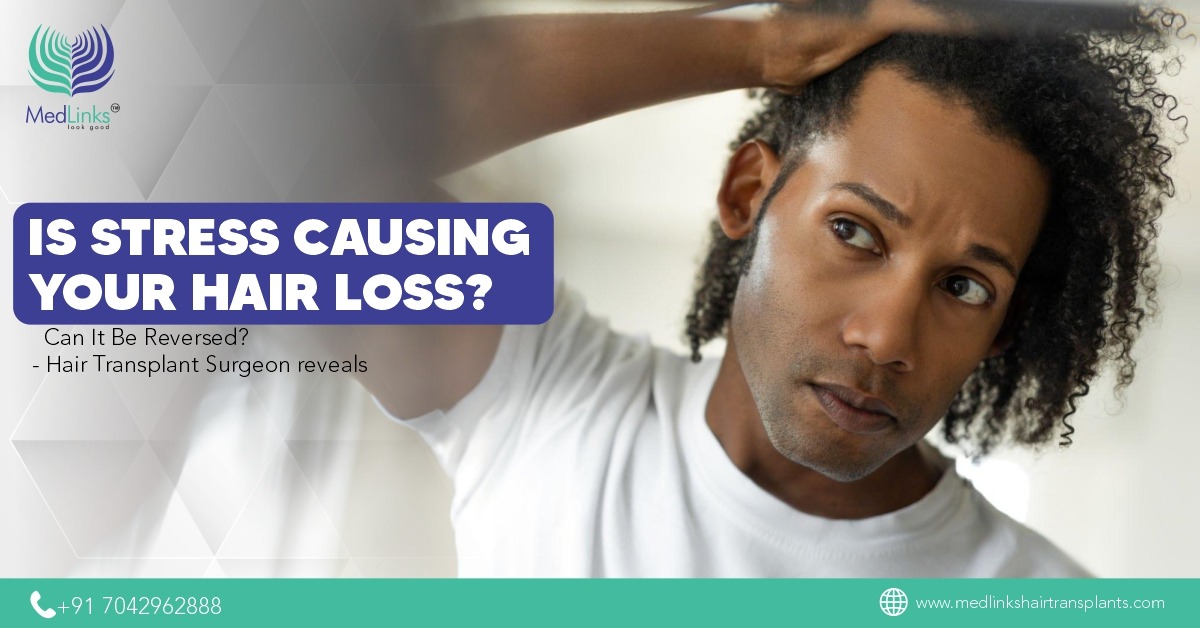
Introduction
Imagine this: you’re brushing your hair in the morning, only to find clumps of it tangled in the bristles. Panic sets in. First thing you do is googling asap the reasons for your hair loss. Is it genetics? Hormonal changes? Or perhaps, is stress the hidden villain in your hair loss frustration?
Welcome to the daily struggle faced by countless men and women (predominantly), who, despite having no family history of hair loss, find themselves battling hair thinning.
Today, let’s open up the controversial and often misunderstood link between stress and hair loss, providing you with a comprehensive guide straight from the best hair transplant surgeon, Dr Gaurang Krishna, Founder and Director, MedLinks.
Is Stress the Second Biggest Cause of Hair Loss After Genetics?
It’s undeniable that genetics play a significant role in hair loss, predominantly in men. However, there is a formidable contender leading upto 50% of hair loss specifically in women at the present context .
Whereas Androgenetic Alopecia is hereditary and progressive, stress-induced hair loss can be sudden and severe that can cause significant distress.
How Stress Leads To Hair Loss – Medical Explanation
Have you ever noticed your hair shedding more than usual after a particularly stressful period? That might be something called Telogen Effluvium, a type of hair loss directly linked to stress.
Here’s a simple breakdown of how stress impacts hair health:
1. Stress Kicks In: When you are stressed emotionally (for instance a break up) or physically due to illness, your body starts releasing stress hormones like cortisol and corticotropin-releasing hormone (CRH).
2. Hair Follicles Hit Pause: Due to these hormones significant number of hair follicles will be pushed into the resting phase known as telogen. Meaning : stress dramatically lengthens the resting phase despite the normal 10-15% rate causing more hair shedding.
3. Shedding Time: A noticeable thinning is apparent after 2-3 months of prolonged stress as the affected hair starts to shed.
The Chronic Stress To Blame For Your hair Loss
Chronic stress, or stress that lasts for a long time, can be particularly damaging to your hair:
* Immune System Ups and Downs: If you keep yourself in stressful situations for a longer period, your cortisol levels will be at peak and can mess up your immune system. It suppresses your immune response which ultimately lead to an overactive immune response and inflammation.
* Inflammation and Hair Loss: This inflammation can target your hair follicles, leading to conditions like Alopecia Areata, where the immune system mistakenly attacks hair follicles. This affects your normal hair growth cycle and pushes more hair into the telogen phase, resulting in more shedding.
Recognizing the Signs of Stress-Induced Hair Loss
So, how do you know if your hair loss is stress-related? Here are some telltale signs:
• Sudden and widespread hair thinning.
• Increased hair shedding, especially noticeable during washing or brushing.
• Chunks of hair fall after a stressful event or prolonged period of anxiety.
How Can You reverse Stress-Induced Hair Loss?
Stress management is crucial for mitigating hair loss. Some of the proven effective strategies include:
• Meditation: Practicing mindfulness helps reduce stress levels significantly.
• Regular Exercise: Physical activity boosts endorphins, helping to lower stress.
• Balanced Diet: Nutrition is another key role to maintain healthy hair.
• Adequate Sleep: Sleep is not just a luxury. It helps in stress reduction too.
Other Forms of Hair Loss Influenced by Stress
Stress doesn’t just cause Telogen Effluvium. It can also trigger conditions like Alopecia Areata, where your own immune system attacks hair follicles, or Trichotillomania, a psychological condition where one obsessively pulls out hair.
When to Seek Medical Attention
If you’re dealing with a lot of hair loss and think stress might be the reason, it’s time to see a specialist. A hair specialist or a trichologist can figure out what’s going on and suggest treatments that work for you. This could be anything from topical solutions and lifestyle changes to, in serious cases, hair transplant surgery.
Don’t wait—getting help early can make a big difference.
Remember, while genetics play a role, managing stress is within your control, and seeking help from experts like those at MedLinks Trichology can make all the difference.
Reconnect with Your Confidence
Don’t let stress rule your life or your hair. Remember – your hair’s health is a reflection of your overall well-being. Stay calm, stay healthy, and keep your hair healthy!
FAQs on Stress and Hair Loss
1. Is hair loss due to stress reversible?
Yes, in most cases, hair loss caused by acute stress is reversible. Once the stressor is removed or managed, hair typically regrows. Chronic stress-related hair loss, however, may require more intensive treatment.
2. Can all types of stress lead to hair loss?
Not all stress leads to hair loss. Acute stress might cause temporary shedding, while chronic stress can cause more severe and long-lasting effects.
3. How long after a stressful event does hair loss occur?
Hair loss from stress usually occurs about 2-3 months after a stressful event due to the hair growth cycle’s phases.
4. What are the best treatments for stress-induced hair loss?
Treatments include stress management techniques, a balanced diet, proper hair care, and in some cases, medical treatments recommended by a trichologist.
5. Can lifestyle changes help with stress-induced hair loss?
Absolutely. Implementing regular exercise, a healthy diet, mindfulness practices, and ensuring adequate sleep can significantly reduce stress levels and improve hair health.





























